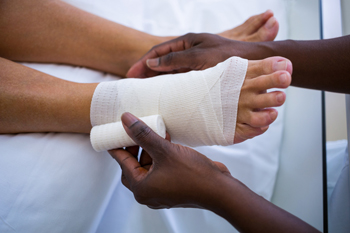
Diabetic foot disease, or DFD, is a serious complication of diabetes that significantly impacts quality of life. Its prevalence has increased due to predisposing factors such as prolonged high blood sugar levels, poor circulation, and impaired immune function. These factors heighten the risk of infections, slow wound healing, and contribute to conditions like diabetic neuropathy, which reduces sensation in the feet. This loss of feeling can lead to unnoticed injuries that develop into diabetic foot ulcers, a common precursor to lower limb amputations. Without proper care, these ulcers can become severely infected, making amputation necessary to prevent life-threatening complications. Podiatrists play a critical role in managing diabetic foot wounds, utilizing advanced treatments such as debridement, specialized dressings, and offloading devices to promote healing and prevent recurrence. If you have diabetes,it is suggested that you schedule regular podiatric appointments to reduce the risks associated with diabetic foot disease.
Wound care is an important part in dealing with diabetes. If you have diabetes and a foot wound or would like more information about wound care for diabetics, consult with Barry P. Weinstein, DPM from Bellaire Podiatry. Our doctor will assess your condition and provide you with quality foot and ankle treatment.
What Is Wound Care?
Wound care is the practice of taking proper care of a wound. This can range from the smallest to the largest of wounds. While everyone can benefit from proper wound care, it is much more important for diabetics. Diabetics often suffer from poor blood circulation which causes wounds to heal much slower than they would in a non-diabetic.
What Is the Importance of Wound Care?
While it may not seem apparent with small ulcers on the foot, for diabetics, any size ulcer can become infected. Diabetics often also suffer from neuropathy, or nerve loss. This means they might not even feel when they have an ulcer on their foot. If the wound becomes severely infected, amputation may be necessary. Therefore, it is of the upmost importance to properly care for any and all foot wounds.
How to Care for Wounds
The best way to care for foot wounds is to prevent them. For diabetics, this means daily inspections of the feet for any signs of abnormalities or ulcers. It is also recommended to see a podiatrist several times a year for a foot inspection. If you do have an ulcer, run the wound under water to clear dirt from the wound; then apply antibiotic ointment to the wound and cover with a bandage. Bandages should be changed daily and keeping pressure off the wound is smart. It is advised to see a podiatrist, who can keep an eye on it.
If you have any questions, please feel free to contact one of our offices located in Bellaire and Houston, TX . We offer the newest diagnostic and treatment technologies for all your foot care needs.